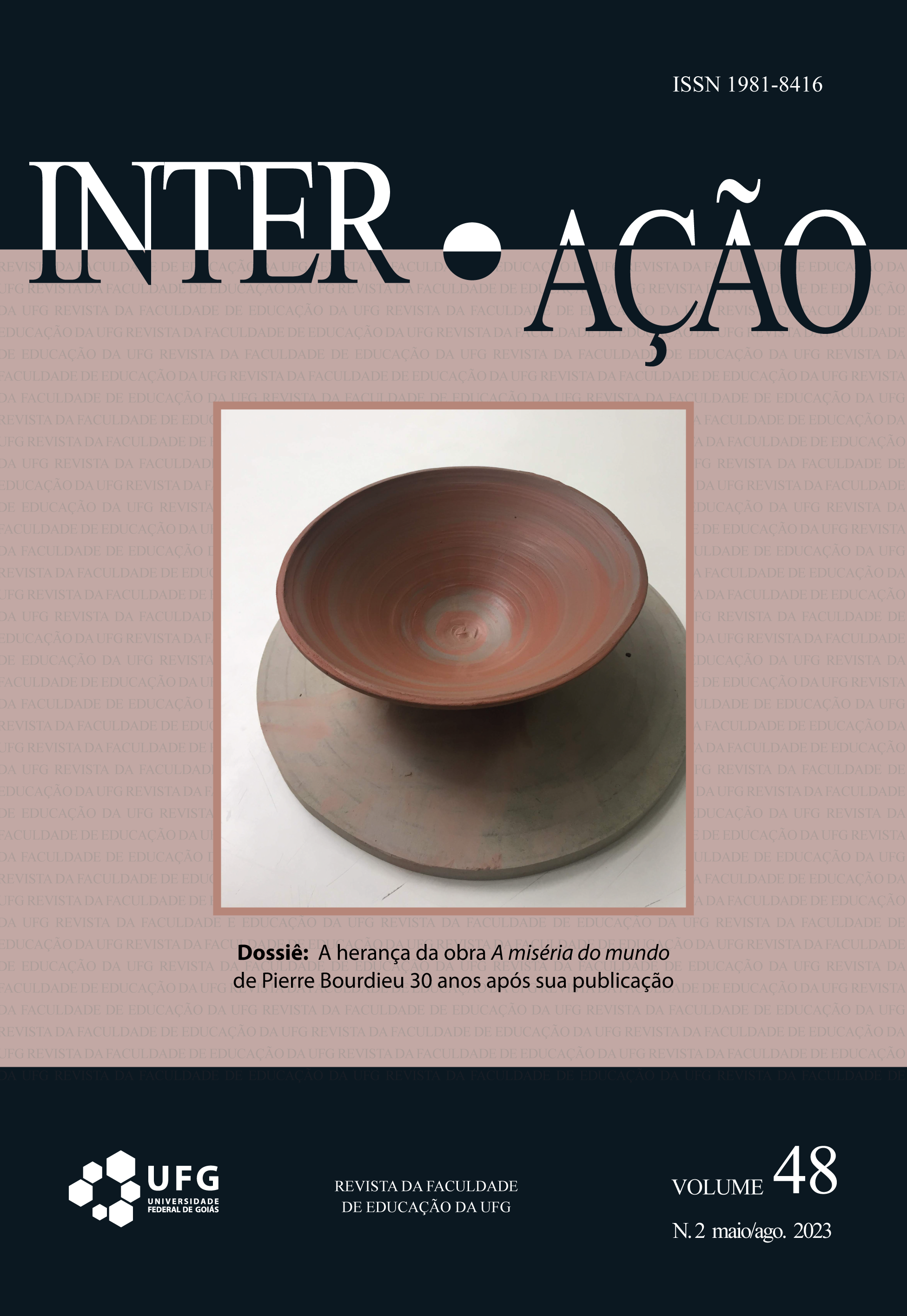QUALIDADE, e-CIDADANIA E EDUCAÇÃO A DISTÂNCIA: UMA RELAÇÃO POSSÍVEL
DOI:
https://doi.org/10.5216/ia.v48i2.77113Keywords:
Distance Education; e-Citizenship; Socially Referenced Quality.Abstract
Este estudo faz parte de uma rede de pesquisa nacional e internacional sobre a regulamentação e qualidade da educação a distância (EaD) e tem como objetivo compreender e relacionar a e-cidadania com a qualidade como elementos importantes do desenvolvimento da garantia de desenvolvimento da EaD numa perspectiva socialmente referenciada. Para isso foi realizado um levantamento bibliográfico no repositório internacional Education Resources Information Center (ERIC), considerando o período 2019-2023. Concluiu-se ser relevante a inclusão da e-cidadania como um dos indicadores da qualidade socialmente referenciada na EaD, pela similitude de seus conceitos e propósitos na formação do profissional cidadão emancipado.
PALAVRAS-CHAVE: Educação a Distância; e-Cidadania; Qualidade Socialmente Referenciada.
Downloads
References
ACOSTA, Alejandra; PALMER, Iris; ROMO-GONZÁLES. Back to basics – quality in digital learning. Washington DC: New America, 2021. Available at: https://www.newamerica.org/education-policy/reports/back-to-basics/. Accessed on: nov. 20, 2022.
BRASIL. Lei nº 9.394, de 20 de dezembro de 1996. Estabelece as diretrizes e bases da educação nacional. Brasília, DF: Presidência da República, Casa Civil, Subchefia para Assuntos Jurídicos, 1996. Available at: https://www.planalto.gov.br/ccivil_03/Leis/L9394.htm/. Accessed on: feb. 15, 2021.
CARPENTER, J. P. Digital Citizenship in the Curriculum. Educational Leadership, [s. l.], v. 75, n. 3, p. 50-55, 2017. Available at: https://www.ascd.org/el/articles/digital-citizenship-in-the-curriculum. Accessed on: oct. 10, 2021.
DOURADO, L. F.; OLIVEIRA, J. F. de. A qualidade da educação: perspectivas e desafios. Cad. Cedes, Campinas, SP, v. 29, n. 78, p. 201-215, 2009.
DUNAWAY, Mary; MACHARIA, Mary. The Effect of Digital Citizenship on Negative Online Behaviors and Learning Outcomes in Higher Education. Journal of Information Systems Education, [s. l.], v. 32, p. 294-307, 2021. Available at: https://jise.org/Volume32/n4/JISE2021v32n4pp294-307.html. Accessed on: dec. 20, 2022.
FLYNN, C. F. Facilitating civility in Distance Education. In: SETZEKORN, K.; PATNAYAKUNI, N.; BURTON, T. (Eds.). Socioeconomics, Diversity, and the Politics of Online Education. Hershey, PA: IGI Global, 2020. DOI:https://doi.org/10.4018/978-1-7998-3583-7. Available at: https://www.igi-global.com/gateway/book/243483. Accessed on: dec. 6, 2022.
FREIRE, P. Pedagogia da esperança - um reencontro com a Pedagogia do Oprimido. 11. ed. Rio de Janeiro: Paz e Terra, 1992.
FREIRE, P. Pedagogia da autonomia: saberes necessários à prática educativa. 26. ed. São Paulo: Paz e Terra, 1996.
HAWAMDEH, M. et al. Comparative analysis of students and faculty level of awareness and knowledge of digital citizenship practices in a distance learning environment: case study. Education and Information Technologies, [s. l.],v. 27, p. 6037–6068, 2022. DOI:
https://doi.org/10.1007/s10639-021-10868-7. Available at: https://link.springer.com/article/10.1007/s10639-021-10868-7. Accessed on: dec. 20, 2022.
LIMA, D. da C. B. P. Formação humana e democracia: relações entre tecnologias digitais e educação. Revista Educação Pública, Cuiabá, v. 31, p.1-16, 2022. DOI: https://doi.org/10.29286/rep.v31ijan/dez.13411. Available at: https://periodicoscientificos.ufmt.br/ojs/index.php/educacaopublica/article/view/13411. Accessed on: dec. 1, 2022.
LIMA, D. da C. B. P; ALONSO, K. M. Entre conceitualizações e tendências: qualidade e inovação na EaD. In: LIMA, D. da C. B. P.; SANTOS, C. de A. (Orgs.). Educação a distância e tecnologias: políticas públicas, qualidade e inovação, Volume 1. Recife: Anpae, 2021, p. 24-38. Available at: https://www.seminariosregionaisanpae.net.br/BibliotecaVirtual/10-Livros/Educacao-a-distancia-e-tecnologiasVOLUME1-050521.pdf. Accessed on: dec. 10, 2022.
MARTIN, F.; GEZER, T.; WANG, C. Educator’s perceptions of student digital citizenship practices. Computers in the schools, [s. l.], v. 36, p. 238-254, 2019. DOI: https://doi.org/10.1080/07380569.2019.1674621. Available at: https://www.tandfonline.com/doi/full/10.1080/07380569.2019.1674621. Accessed on: dec. 10, 2022.
PAIS, A.; COSTA, M. An ideology critique of global citizenship education. Critical Studies in Education, [s. l.], v. 61, n. 1, p. 1-16, 2020. DOI: https://doi.org/10.1080/17508487.2017.1318772. Available at: https://www.tandfonline.com/doi/full/10.1080/17508487.2017.1318772. Accessed on: dec. 10, 2022.
RIBBLE, M. Digital citizenship in schools – nine elements all students should know. 3.ed. Washington DC: ISTE, 2015.
SILVA, M. A. da. Qualidade social da educação pública: algumas aproximações. Cad. Cedes, Campinas, v. 29, n. 78, p. 216-226, 2009. Available at: http://www.scielo.br/scielo.php?script=sci_arttext&pid=S0101-32622009000200005. Accessed on: jul. 10, 2019.
STOCCHETTI, M. The politics of Educational Reform in the Digital Age: concepts, assessment and Subversions. In: STOCCHETTI, M. (Ed.). Media and education in the Digital Age: concepts, assessments, subversions. Berlin: Peter Lang, 2014. p. 19-39. Available at: https://library.oapen.org/bitstream/id/dc723f64-b787-434b-a2e5-df232688483c/1004272.pdf. Accessed on: jan. 10, 2022.
STODDARD, J. The need for media education in democratic education. Democracy & Education, [s. l.], v. 22, n. 1, Article 4, 2014. Available at: https://democracyeducationjournal.org/cgi/viewcontent.cgi?referer=&httpsredir=1&article=1185&context=home. Accessed on: oct. 10, 2021.
Published
How to Cite
Issue
Section
License
Copyright (c) 2023 Daniela da Costa Britto Pereira Lima

This work is licensed under a Creative Commons Attribution-NonCommercial 4.0 International License.
Inter-Ação uses the Creative Commons Attribution 4.0 License for Open Access Journals (Open Archives Initiative - OAI) as the basis for the transfer of rights. Open access means making documents available on the Internet free of charge, so that users can read, download, copy, distribute, print, search, or link to the full text of documents, process them for indexing, use them as input data for software programs, or use them for any other lawful purpose, without financial, legal, or technical barriers.
Authors publishing in this journal agree to the following conditions:
1) Authors retain copyright and grant the journal the right of first publication, with the work simultaneously licensed under the Creative Commons Attribution License, which permits redistribution of the work with attribution and first publication in this journal.
2) Authors are permitted to enter into additional, separate agreements for non-exclusive distribution of the version of the work published in this journal (e.g., for publication in an institutional repository or as a book chapter), with attribution and first publication in this journal.
3) Authors are permitted and encouraged to publish and distribute their work online (e.g. in institutional repositories or on their home page) at any time before or during the editorial process, as this may generate productive changes as well as increase the impact and citation of the published work.















